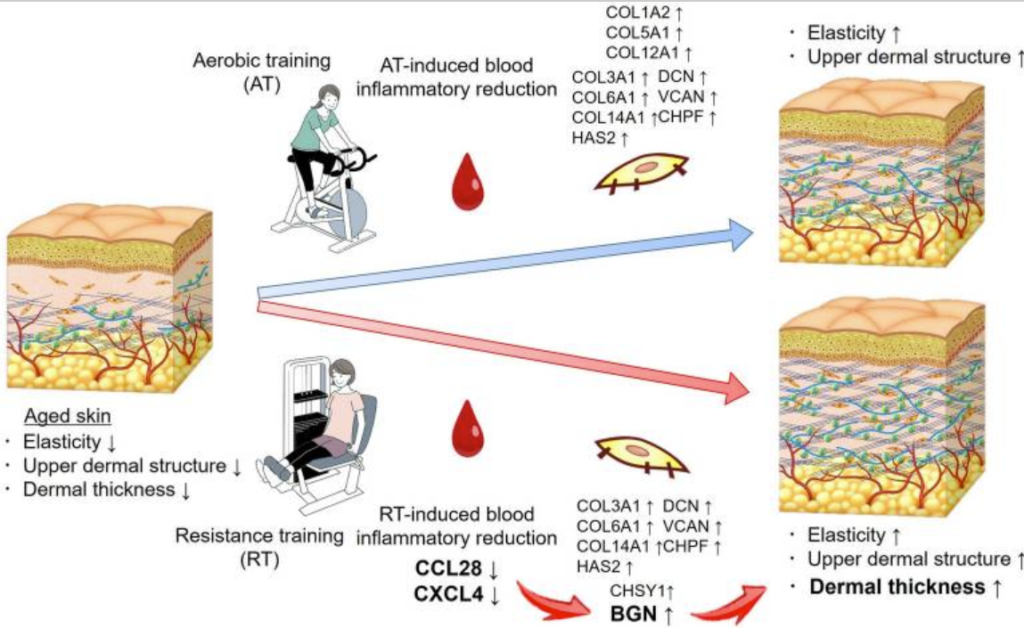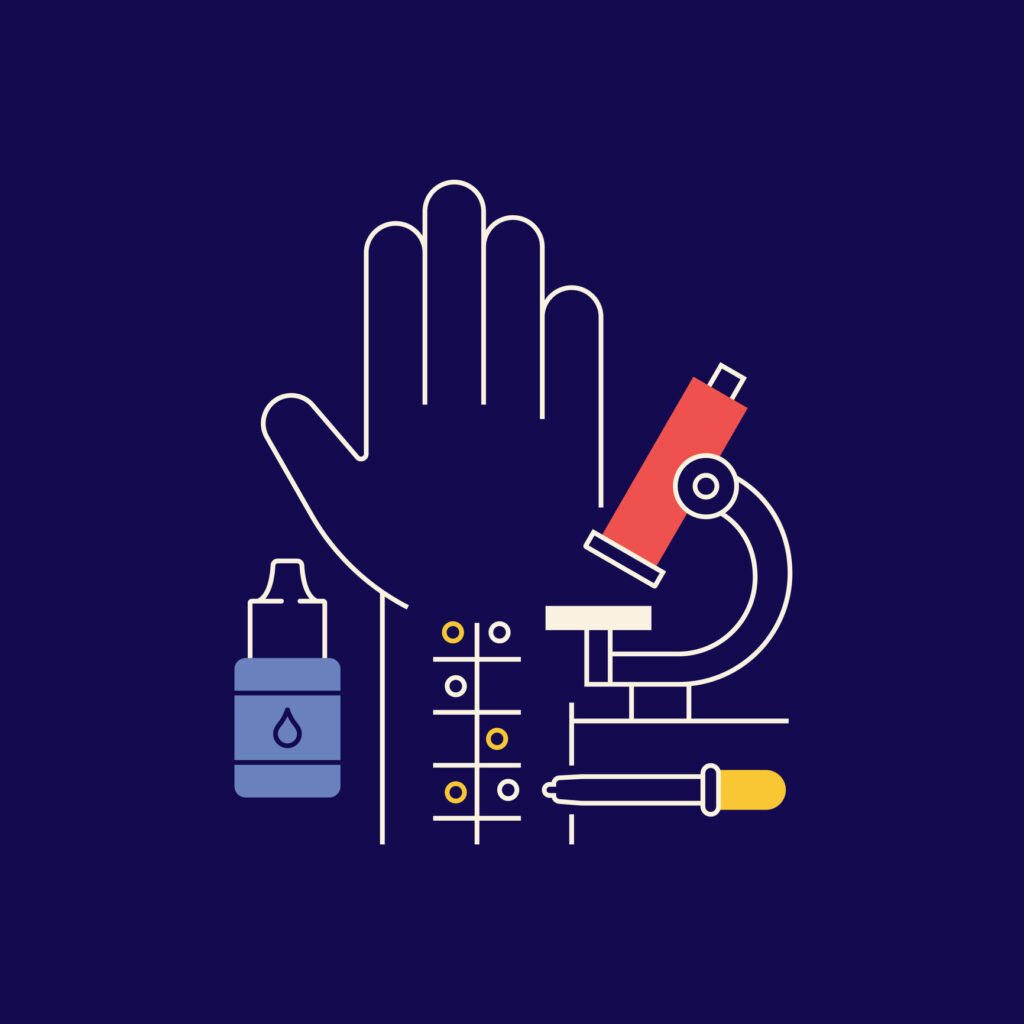Over the past years, we had amazing conversations with dermatologists, delivered clinical trials and read interesting papers, so we decided to compile this list.
We aim to update this list as we conduct more clinical research.
Avoid the sun and wear tinted high-SPF sunscreen
Chronic sun exposure is the main reason behind ageing. This is a reason that areas of the body exposed to the sun such as the face, neck, or back of the hands acquire visible signs of ageing more rapidly than other areas of the body. Wear high-SPF and tinted sunscreen! Tinted sunscreen is better at preventing hyperpigmentation since there is an additional physical UV barrier.
Sunbathing and getting sunburnt increases the risk of skin cancer. Sunburn is a sign of DNA damage in the skin and your body’s response to try to repair it.
Although, a small amount of sun is needed to generate the Vitamin D that our body needs, but no need to sunbathe or risk getting sunburnt to get Vitamin D. Some even recommend taking Vitamin D supplements instead of going out in the sun at all.
Quit smoking
Smoking accelerates the pace of ageing. You may not notice it when you are young but the manifestation of its harmful effects becomes apparent at older age. There is a famous twin study that showed this perfectly when one twin is a smoker and loves sunbathing whereas the other one is not.
Figure 1: Aged 61, Jeanne (left) is the twin who commented that her sister looks “ten years older”. The reasons for Susan’s condition are that she smoked for 16 years of her life, sunbathes, and weighs 15 pounds less. Susan (right) has spent as much time as she could in the sun (she has plenty of opportunity on Florida’s east coast, where she moved more than a decade ago). Jeanne, meanwhile, has aimed for “as little exposure as possible.”
Hormone replacement therapy (HRT) for post-menopause
HRT plays a significant role in mitigating the effects of skin ageing, particularly in postmenopausal women. Oestrogen, a key hormone, plays a crucial role in maintaining skin elasticity, hydration, and thickness. As oestrogen levels decline with age, the skin may become thinner, drier, and more prone to wrinkles and sagging. HRT replenishes oestrogen levels, thereby helping to preserve the youthful characteristics of the skin. One study has shown that HRT can improve skin elasticity, reduce wrinkles, and increase collagen production. Additionally, HRT may also help in reducing the appearance of age spots and promoting an overall more youthful complexion.
However, it’s essential to consult with a healthcare professional to weigh the potential benefits and risks of HRT before initiating treatment, as individual health factors and medical history can influence its suitability.
Reduce Inflammation: use anti-oxidants (Vitamin C, Niacinamide)
Chronic inflammation, often associated with various skin disorders, significantly accelerates the ageing process.
Antioxidants like Vitamin C and oral Vitamin B3 (Niacinimde) have been shown to repair DNA and reduce skin inflammation after sun exposure.
Niacinamide has been shown to decrease the number of new basal cell carcinomas and squamous cell carcinomas by 23% at one year of treatment with 500mg two times a day.
The number of actinic keratoses, sometimes referred to as “pre-cancers” has also been shown to be reduced in patients taking niacinamide. Niacinamide is thought to work by boosting the immune response to skin cancers and enhancing cellular repair mechanisms.
Exercise
Aerobic training and resistance training have been shown to combat skin ageing. A study has shown that resistance training increases dermal thickness more than aerobic training. Dermal thickness is known to decrease with age.

Have a skincare routine
Dr Kathy Fields, a board-certified dermatologist gives her top skincare routine in this video.
- Have a skincare routine: cleanser, toner, lotion, sunscreen
- Use tinted sunscreen
- Buy all products from the same brand to avoid clogging with different formulations
- Let the serum dry before applying the next layer
Get 8-hours sleep
During eight hours of sleep our bodies go through three distinct stages that contribute to our overall well-being – and aid in the nightly restoration of our skin.
In the first three hours of sleep, the pituitary gland produces somatotropin, the human growth hormone. This hormone contributes to the maintenance of youthful and healthy skin. Without somatotropin your skin does not repair as well from day to day. Inadequate somatotropin accelerates the ageing process.
Production of the hormone melatonin increases during the next two hours of sleep. Melatonin works as an antioxidant that helps protect the skin from damaging free radicals (unstable atoms that cause illness and ageing).
During the final stage known as REM sleep (Rapid Eye Movement), your cortisol levels begin to decrease along with skin temperature. Cortisol is a stress hormone. As the skin cools, our muscles relax and collagen production increases. Collagen is a protein found throughout the body. It makes skin more supple and smooth, easing out fine wrinkles.
Good sleep that promotes collagen production allows the skin to make its strongest recovery of the night.
Avoid processed food and try intermittent fasting
Diet plays a pivotal role in influencing the ageing process of the skin, with nutrient-rich foods offering a plethora of benefits for skin health and vitality. Consuming a balanced diet abundant in fruits, vegetables, lean proteins, and healthy fats provides essential vitamins, minerals, and antioxidants necessary for maintaining optimal skin function.
Omega-3 fatty acids found in fatty fish, flaxseeds, and walnuts contribute to skin hydration and elasticity, promoting a youthful complexion. Additionally, adequate hydration through water and hydrating foods maintains skin moisture levels, enhancing its plumpness and smoothness. Conversely, diets high in processed foods, refined sugars, and unhealthy fats can promote inflammation and exacerbate skin ageing processes.
Intermittent fasting has great benefits. In Fast Like a Girl, Dr Mindy Pelz gives a fasting routine in line with women’s cycle.
Mitra Bio is building a non-invasive skin diagnostics platform capable of measuring skin ageing. At the moment biopsies are necessary to get good skin ageing measurements which makes clinical trials expensive and hard to recruit for.
With cheaper/easier skin ageing diagnostics, we will start to see better data around the efficacy of potential anti-ageing dermatological treatments which may help both accelerate the development of such therapies and improve adoption once therapies are developed.


